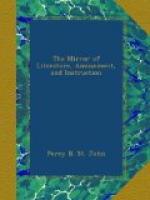A lapse of a few weeks ensued, during which I heard nothing further from my persecutor; when, one dark November evening—one of those peculiarly English evenings, full of fog and gloom, when the half-frozen sleet, joined in its descent by gutters from the house-tops, comes driving full in your face, blinding you to all external objects—on one of these blessed evenings, on my road to Camden Town, I chanced to miss my way, and was compelled, notwithstanding a certain shyness towards strangers, to ask my direction of the first respectable person I should meet. Many passed me by, but none sufficiently prepossessing; when, on turning down some nameless street that leads to Tottenham Court-road, I chanced to come behind a staid-looking gentleman, accoutred in a dark brown coat, with an umbrella—the cotton of which had shrunk half-way up the whalebone—held obliquely over his head. Hastily stepping up to him, “Pray, sir,” said I, “could you be kind enough to direct me to —— place, Camden Town?”
The unknown, thus addressed, made the slightest possible inclination towards me; and then, in an under tone, “I believe, sir, your name is D——?”
I paused; a vague sort of recollection came over me. Could it be?—no, surely not! And yet the voice—the manner—the—the—
My suspicions were soon converted into certainty, when the stranger, with his own peculiar expression, quietly broke forth a second time with, “Touching that little account—”
This was enough; it was more than enough—it was vexatiously superfluous. To be dunned for a debt, at the very time when the nerves could best dispense with the application; to be recalled back to the vulgarities of existence, at that precise moment when the imagination was most abstracted from all commercial common-places; to be stopped by a tailor, (and such a tailor!) when the mind was dreaming of a mistress—the bare idea was intolerable! So I thought; and, without further explanation, hurried precipitately from the spot, nor ever once paused till far removed from the husky tones of that sepulchral voice which had once before so highly excited my annoyance.
[The narrater then visits one of Mr. Champagne Wright’s masquerades, where he falls in love with a fresco nun. He receives a billet.]
I stood like one bewildered; but, soon recovering my self-possession, moved direct towards the chandelier, with a view to peruse an epistle expressive of woman’s fondest love. As with glistening eyes I proceeded to tear open the billet, a flood of transporting thoughts swept over me. I fancied that I was on the eve of acquaintance with ——; but, judge my astonishment, when, instead of the expected document, the key to such transporting bliss, I read, engraved in large German text, on a dirty square card, embossed at the edge with flowers, the revolting, business-like address of
Mr. Thomas M——e,
Tailor,
116, High Holborn.




